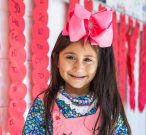We are excited to welcome our kindergarten families to CMCSS! Whether this is your first student in the district, or you are an experienced first-day family, here are some things you should know as we begin the school year.
Registration and Enrollment
If you have not yet signed up for school, you can register online at parents.cmcss.net.
Online registration is the first step in the enrollment process. Families will still need to turn in important registration documents in person to either the Enrollment Center or their child’s school once the school front offices reopen on July 21.
If you need technical assistance or prefer to register in person, please contact the Enrollment Center at 931-542-5078 to set up an appointment.
See a list of the necessary documents here.
Elementary School Open Houses
All elementary schools will host Open Houses on Friday, August 5 from 5-7 p.m. This is a great time to visit with your child’s teacher, tour the school, and learn about a typical kindergarten day! If families have already purchased classroom supplies, this is a great time to bring those to school.
First Day of School
All kindergarteners will attend the half-day of school on Monday, August 8. Each elementary school will host its first day of school in a manner best suited for its families. While it is not required that families attend the entire half-day, some may choose to do so. Additional information will be provided by each school.
What does my student need to bring on the first day of school?
This half-day is designed to make your child comfortable with the transition to school. While nothing is required to bring on the first day, they can carry their backpack and water bottle. It may also be a good time to drop off school supplies.
Can I walk my child into school on the first day?
Yes, parents are welcome to walk with their children into school on Monday, August 8, and attend a brief meeting. Teachers are ready to greet families in their classrooms. More information on the first day of school will be provided during the Open House on August 5.
Kindergarten Flex Days (August 11-12; 15-16)
Schools will communicate individually with families regarding kindergarten flex days. Your child will be scheduled to come into school on one of the four days following August 8. All kindergarteners will then begin school on Wednesday, August 17 for their first full day of school. Caregivers can walk their child to class on their assigned flex day, where teachers will acclimate students to the schedule and routines of a typical kindergarten day.
Riding the Bus
If your child will ride the school bus to and from school, rest assured that school staff are waiting to help them navigate their way to the classroom! Families can assist with the bus rider process by helping their child learn their bus number and writing the bus number in a safe location where your child can find it. If you have questions about the bus rider process, someone will be able to assist you at the Open House.
School Supplies
Each teacher will have specific school supplies for their classroom that will be communicated on one of the first days of school. Families can find a general school supply list here.
If you would like to help your child’s teacher with additional classroom supplies, you can connect with them directly during the Open House.
Other Helpful Information
We are thrilled to have your child join us this school year. While everyone experiences a mix of emotions at the start of school, remember our CMCSS teachers are here to work with you and support your child throughout their academic journey.
This video provides helpful ways you can work with your child to prepare for kindergarten!













